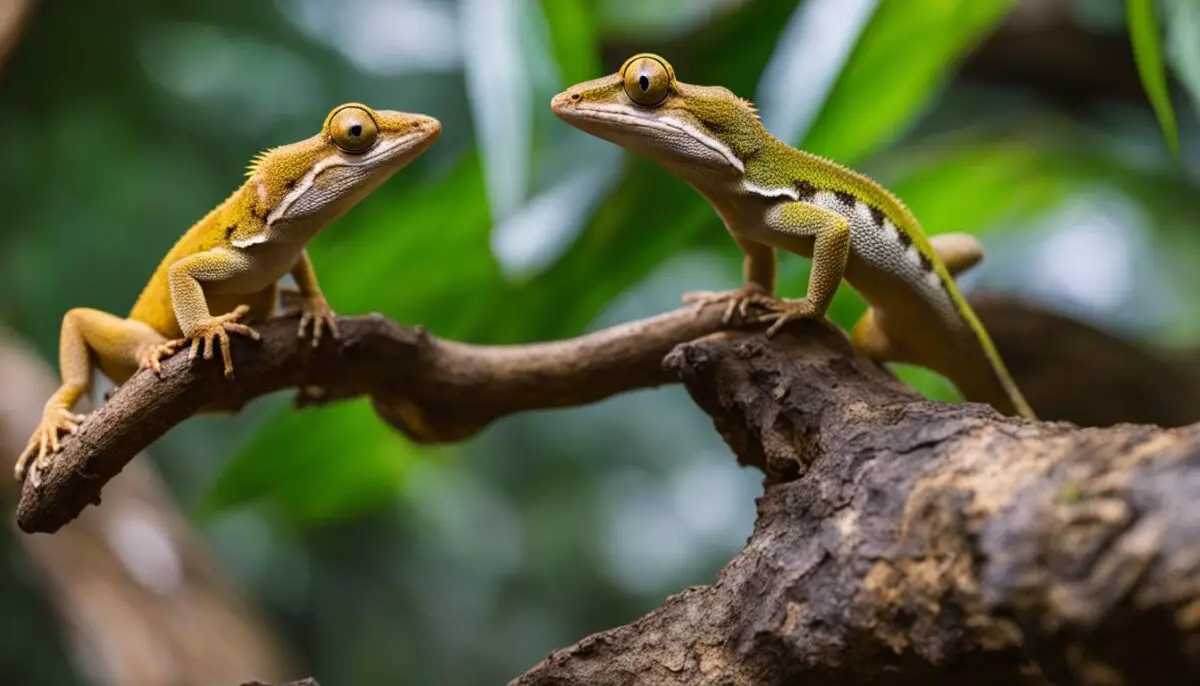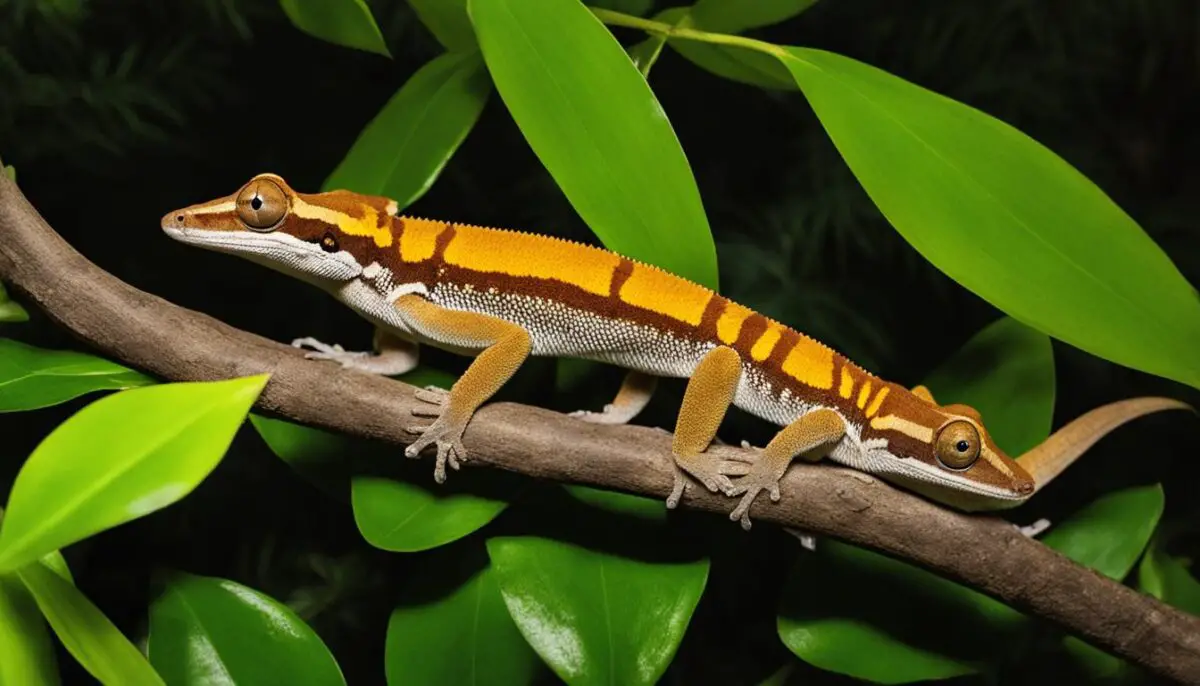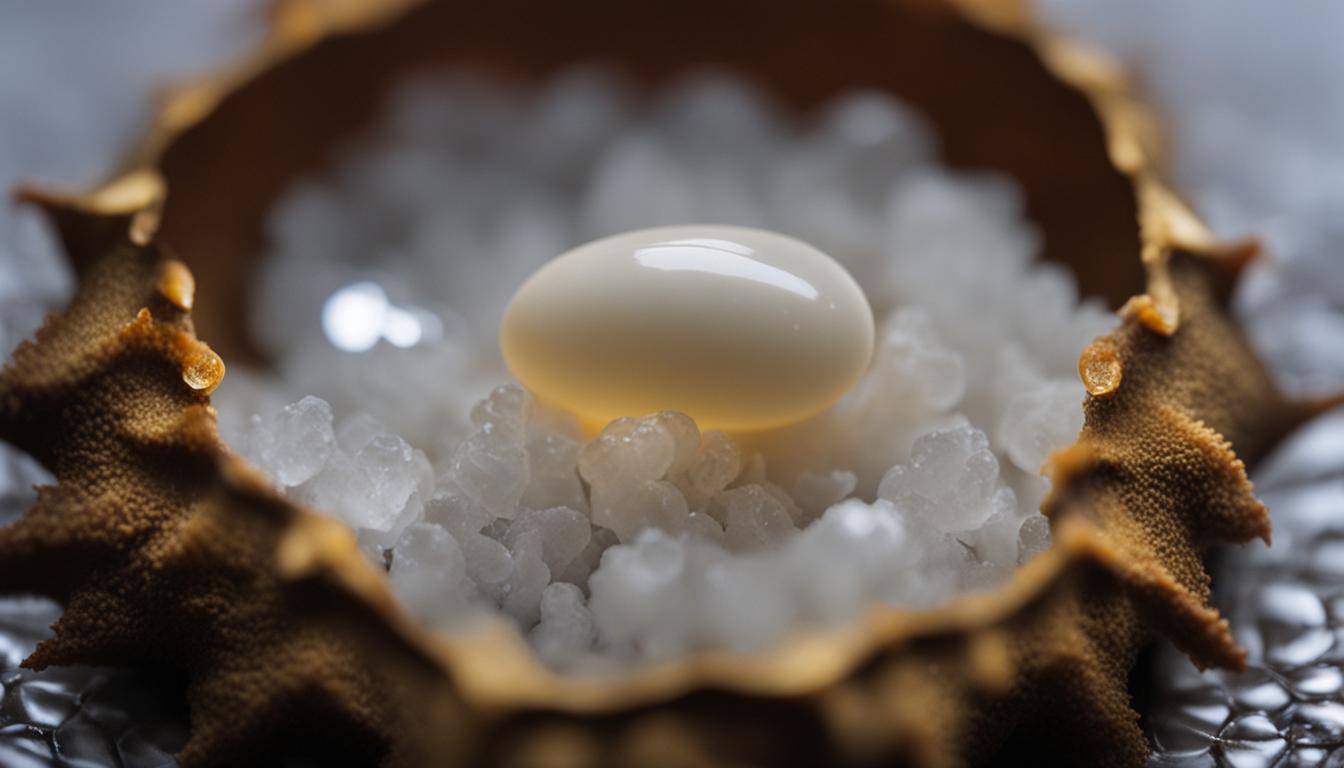Breeding crested geckos can be an exciting and rewarding experience. Whether you’re a seasoned breeder or just starting out, understanding the basics of crested gecko egg care and incubation is essential for the health and successful hatching of these fascinating creatures.
So, if you’re wondering how to properly care for crested gecko eggs, handle the incubation process, and ensure the survival of these delicate little ones, you’ve come to the right place. This comprehensive guide will provide you with essential tips and strategies to make your crested gecko breeding journey a successful one.
But first, let’s dive into the fascinating world of crested geckos, their eggs, and the intricacies of incubating these precious gems.
Key Takeaways:
- Proper crested gecko egg care and incubation are vital for successful hatching.
- Understanding the readiness of your geckos for breeding is crucial.
- Pairing and mating behavior play a significant role in successful reproduction.
- Creating the optimal incubation conditions is essential for healthy embryo development.
- By following the guidelines in this guide, you can increase your chances of successful breeding and hatching.
Should I Breed My Crested Geckos?
Before embarking on a breeding journey, it is essential to consider whether breeding crested geckos is the right decision for you. While the idea of breeding these fascinating creatures may be intriguing, it’s crucial to understand the responsibilities and commitment involved. Breeding crested geckos requires a deep knowledge of their care requirements, a dedication to their well-being, and a thorough understanding of genetics.
When considering whether to breed your crested geckos, it’s important to evaluate your goals and motivations. Are you breeding them for personal enjoyment or do you intend to sell the offspring? If the latter, it’s key to ensure that you have a market for the geckos you produce. Connecting with established crested gecko breeders and researching the demand for crested geckos in your area can provide valuable insights.
Genetics play a significant role in breeding crested geckos. It’s important to understand the traits and characteristics you are trying to achieve with your breeding program. Breeding geckos with desirable traits requires careful selection and pairing of individuals with compatible genetics. This ensures that the offspring display the desired attributes and are genetically healthy.
Remember, responsible breeding practices prioritize the well-being and genetic health of the geckos. Always strive to produce healthy and vibrant offspring, avoiding any practices that could compromise their welfare.
Additionally, being a breeder means taking on the responsibility of finding suitable homes for the geckos you produce. It’s essential to be prepared to invest time and effort into marketing and networking with potential buyers. Building a reputation as a trustworthy and reputable breeder takes time and dedication.
To summarize, breeding crested geckos requires a deep understanding of their care needs and genetics, as well as a commitment to responsible breeding practices. Before embarking on this journey, evaluate your goals, market demand, and your ability to provide the necessary care and find suitable homes for the geckos you produce. Breeding crested geckos can be a rewarding experience, but it’s essential to approach it with careful consideration and a focus on the well-being of these amazing creatures.

Key Points to Consider:
- Understand the care requirements and genetics of crested geckos before breeding.
- Evaluate your goals and motivations for breeding.
- Research the market demand for crested geckos in your area.
- Ensure you have a reliable network of potential buyers for the geckos you produce.
- Consider the time and effort required for marketing and networking as a breeder.
- Prioritize the well-being and genetic health of the geckos in your breeding program.
When Are Geckos Ready To Breed?
Understanding the readiness of your crested geckos for breeding is crucial for successful reproduction. To ensure optimal breeding conditions, it is important to consider the geckos’ age, weight, and size.
Male Crested Geckos
Male geckos should reach a weight of around 35-40 grams before they are ready to breed. This weight is indicative of their maturity and ability to produce viable sperm. It is essential to ensure that male geckos are in good health and have reached their optimal weight before introducing them for breeding.
Female Crested Geckos
Female crested geckos, on the other hand, should weigh at least 40 grams before they can be considered ready to breed. This weight requirement ensures that female geckos have enough body reserves to safely carry and lay their eggs without depleting their resources.
It is important to note that the age and weight requirements mentioned above are general guidelines. While age and weight are important indicators of maturity, every gecko may slightly vary. Observing their overall health, behavior, and physical development will help determine if they are ready to breed.
By ensuring that your crested geckos meet the appropriate age and weight criteria, you can increase the chances of successful breeding and the overall health of the offspring. Remember to provide a suitable and comfortable environment for your geckos’ breeding process.
Take a look at the table below for a summarized overview:
| Gender | Weight (grams) |
|---|---|
| Male Crested Geckos | 35-40 grams |
| Female Crested Geckos | At least 40 grams |
Keep in mind that crested geckos may also need to reach a sufficient size for breeding. The ideal breeding size for geckos may vary depending on their individual growth rates and species. It is advisable to consult with a reptile expert or breeder to determine the appropriate breeding size for your specific gecko.

Common Pairing and Mating Behaviors:
- Male crested geckos chirping and head bobbing to attract females.
- Male gently biting the female’s head crests during mating.
- Female showing aggression or trying to escape if not receptive.
Understanding the natural behaviors of crested geckos during pairing and mating is crucial for successful reproduction. By creating a suitable environment and closely monitoring their interactions, breeders can ensure the best chances of a successful breeding outcome.
Incubation and Hatching
Proper crested gecko egg incubation and care are crucial for the successful hatching of these fascinating reptiles. Providing a suitable lay box for the female gecko to deposit her eggs is an essential part of the process. Additionally, maintaining the right temperature and humidity levels during incubation is vital for the development of healthy embryos. This section will guide you through the steps of incubating crested gecko eggs and creating optimal conditions for successful hatching.
“The careful incubation of crested gecko eggs is the key to ensuring the healthy development and hatching of the embryos.”
Creating the Ideal Incubation Environment
When it comes to crested gecko egg care, creating a suitable incubation environment is critical. Here are the key factors to consider:
- Temperature: Maintain a consistent temperature between 75 to 80 degrees Fahrenheit (24 to 27 degrees Celsius) throughout the incubation period. Fluctuations in temperature can negatively impact embryo development.
- Humidity: The humidity levels in the incubation container should be around 80%. This moist environment helps prevent the eggs from drying out and maintains the necessary moisture for proper embryo development.
- Substrate: Fill the incubation container with a suitable substrate, such as vermiculite or perlite, mixed with water. The substrate should be moist but not overly wet.
The Incubation Process
Follow these steps for successful crested gecko egg incubation:
- Remove the eggs from the lay box with care and gently clean off any dirt or debris. Avoid rotating or shaking the eggs, as this can disrupt embryo development.
- Prepare your incubation container by filling it with a suitable substrate, moistened to the appropriate humidity level.
- Make small indentations in the substrate using your fingers or a tool, ensuring each indentation is large enough to cradle an egg without burying it completely.
- Place each egg gently into its respective indentation, ensuring they are not touching or overlapping. This allows for proper airflow and prevents potential damage during incubation.
- Cover the eggs with a thin layer of the substrate, ensuring they are still partially visible. This layer helps maintain consistent humidity levels around the eggs.
- Place the container in a warm area with a stable temperature, away from direct sunlight and drafts.
Monitor the temperature and humidity levels regularly, making necessary adjustments to ensure they remain within the optimal range throughout the incubation period. Avoid frequent disturbance of the eggs, as this can disrupt development. The incubation period for crested gecko eggs typically ranges from 60 to 90 days.
| Temperature | Humidity | Incubation Period |
|---|---|---|
| 75-80°F (24-27°C) | 80% | 60-90 days |
Conclusion
Breeding crested geckos can be an exciting and rewarding experience for reptile enthusiasts. With the help of this crested gecko breeding guide, you now have a comprehensive understanding of the essential care and incubation tips for successfully hatching crested gecko eggs.
Remember, careful planning and proper care are crucial throughout the breeding process. By providing optimal conditions, such as a suitable lay box and maintaining the right temperature and humidity levels during incubation, you can increase your chances of a successful breeding and hatching experience.
Always prioritize the health and well-being of your geckos. Pay close attention to their breeding age, weight, and mating behavior to ensure successful reproduction. By following this guide and investing time and effort into crested gecko care, you can embark on a rewarding journey as a crested gecko breeder.
FAQ
What is crested gecko egg care?
Crested gecko egg care refers to the necessary steps and conditions required to ensure the health and successful incubation of crested gecko eggs. It involves providing suitable lay boxes, maintaining appropriate temperature and humidity levels, and monitoring the development of the eggs until they hatch.
How do I hatch crested gecko eggs?
To hatch crested gecko eggs, you need to create an ideal incubation environment. This includes placing the eggs in a suitable incubation container, maintaining a consistent temperature of around 72-80°F (22-27°C), and keeping the humidity level between 70-80%. It typically takes around 60-90 days for the eggs to hatch, but this can vary.
Can I breed crested geckos without knowing their genetics?
While it is possible to breed crested geckos without extensive knowledge of their genetics, it is highly recommended to have a basic understanding of their genetic traits and potential outcomes. Knowing the genetic backgrounds of the geckos will help you make informed decisions when breeding and selecting pairings for desired traits.
How do I know if my female crested gecko is ovulating?
Female crested geckos may exhibit physical signs of ovulation, such as increased appetite and a swollen abdomen. Additionally, they may show receptive behavior towards male geckos, such as accepting their advances and allowing mating attempts. Observing these signs can indicate that your female gecko is ovulating and ready for breeding.
How long does it take for crested gecko eggs to hatch?
The incubation period for crested gecko eggs can vary but typically ranges between 60-90 days. Factors such as temperature, humidity, and genetics can influence the hatching time. It is important to be patient and maintain the appropriate conditions to support the healthy development and hatching of the eggs.
Should I assist in the hatching process if the eggs do not hatch on their own?
It is generally not recommended to assist in the hatching process unless absolutely necessary. The embryos inside the eggs have their own natural mechanisms to hatch, and interfering may cause harm. If there are concerns about the well-being of the hatchlings or if the eggs seem to be overdue, it is advised to consult with an experienced breeder or reptile veterinarian for guidance.


